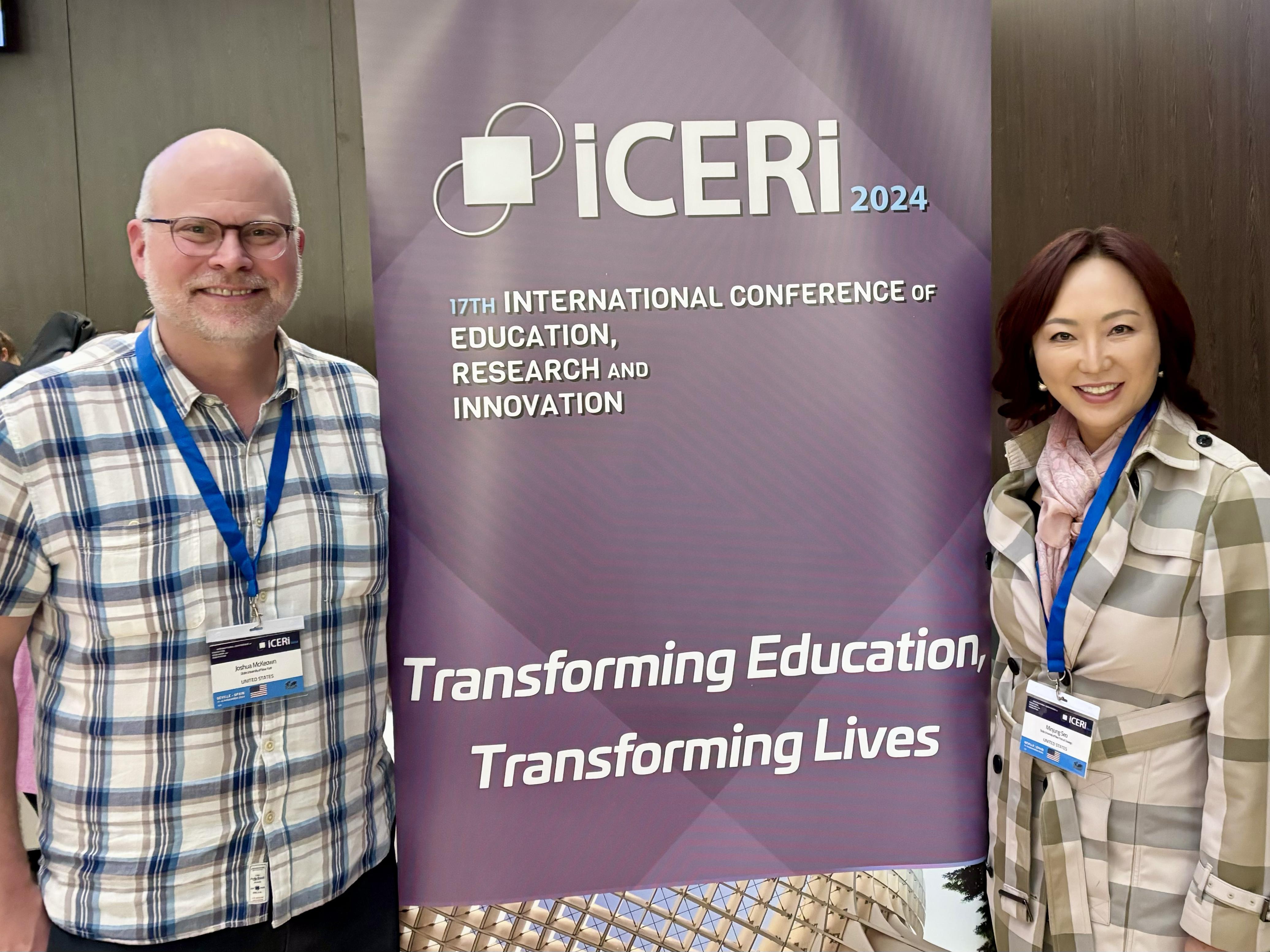Health promotion and wellness faculty member Minjung Seo (right) has recently been named a SUNY COIL (Collaborative Online International Learning) Ambassador. Seo is shown here at the International Conference of Education, Research and Innovation in Spain with Joshua McKeown, associate provost for international education. Those two, plus Jessica Harris, chair of health promotion and wellness, are co-editors of a new book about how to create successful online collaborative courses.
A proven track record of creating collaborative courses spanning continents has earned health promotion and wellness faculty member Minjung Seo the role of SUNY COIL (Collaborative Online International Learning) Ambassador.
Seo actively leads international education initiatives, including a COIL partnership with the Hague University of Applied Sciences in the Netherlands. Through COIL, she promotes global engagement and cross-cultural collaboration in health promotion. Her teaching and research emphasize practical strategies for fostering wellness across diverse populations.
Seo describes her role as an ambassador as “a guide, a resource person, a storyteller talking about the success of the past eight years” of collaborative courses for those interested in doing their own courses.
“I help others learn about how to plan projects, make the right connections and deliver the program,” Seo explained. “I make suggestions as a mentor. I help those with an interest in developing a COIL course.”
Her work focuses on health promotion program development, implementation and evaluation, with a commitment to inclusive and community-centered approaches.
Ambassadors are selected in recognition of their teaching innovations and contributions to the SUNY COIL community of practice. They embrace experiential learning and inclusive teaching and learning practices.
This role asks ambassadors to make meaningful connections between people, cultures and ideas, offering engaging and globally relevant educational experiences. They incorporate virtual exchange opportunities as an exemplar for all learners and faculty.
“Engaging in COIL has been one of the most rewarding aspects of my teaching,” Seo said. “It opens a window for students — and for myself — into different cultures, perspectives and ways of thinking about health promotion.”
Connections and perspective
Seo’s own experience started when John Kane, Oswego’s longtime director of the Center for Excellence in Learning and Teaching and a Distinguished Service Professor of Economics, encouraged her to attend a COIL conference in New York City in 2018, where she connected with Tonnie van Genugten of the Hague University.
“She used the same health promotion theories and models I use in my class,” Seo recalled. While van Genugten’s focus was more as a dietician, both professors focused on health promotion project planning. The resulting class, “Health Promotion Across Borders,” has run ever since.
“We hit it off,” Seo said. “That summer, we had a lot of Zoom calls to develop a six-week program. The school was very supportive.”
That support continued in 2019, when Seo received funding from the Office of International Education and Programs to go to the Netherlands to meet faculty members and expand the program. The schools now run two sections of the international collaborative class, with Jessica Harris, chair of health promotion and wellness, leading the other one from the Oswego side. Over the eight years, three other professors on the Netherlands side have been teaching a large section."
Every year since, Seo and international course collaborators have published journal articles together, sometimes presenting at conferences as well.
The courses have been “very successful” over the years, Seo said, even with some changes. Notably, during the height of the COVID pandemic, the course added an emphasis on studying student mental health, given all the additional challenges.
“The perspective of what was going on globally was very important at that point,” Seo recalled.
The courses play a pivotal role, as students need to have a global perspective to succeed in this increasingly internationally connected world, Seo said.
“They must be aware of global events,” Seo emphasized. “Equally important is developing intercultural communication skills and cultural competence to effectively collaborate with students from other countries. They need to cultivate the ability to engage with people from diverse backgrounds, which in turn fosters self-confidence, which is an essential component of both personal and professional growth.”
Additionally, COIL courses help students who are unable to study abroad to gain these skills, which is an important measure for accessibility and equitability, Seo said.
New book coming
The COIL collaborations, and Oswego’s position as a leader in this field, also led to an opportunity for Seo, Harris and Joshua McKeown, associate provost for international education, to edit a book on the topic of innovative and successful international collaborative online courses.
Seo said that came from attending the International Conference of Education, Research and Innovation in Spain, where the Oswego delegation discussed the framework they have created for successful COIL projects.
Springer, one of the top international academic publishing houses, approached Oswego’s experts about editing a book on the topic, currently slated for a December 2026 publication date.
Seo will serve as the corresponding editor, with Harris and McKeown as editors.
The book will feature 10 chapters from educators around the globe working on collaborative courses, with the Oswego editorial team writing a few chapters introducing and summarizing the concepts and lessons learned.
“Watching students build confidence, develop cultural sensitivity and form genuine international connections reminds me why global learning matters,” Seo said. “While coordinating across time zones and academic systems can be challenging, the benefits far outweigh the hurdles. COIL transforms a classroom into a global community, where learning becomes deeper, richer and truly collaborative.”




